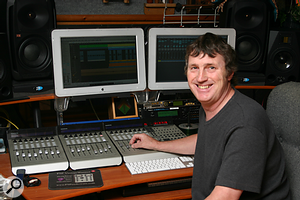Over the past couple of years, I've visited quite a few schools and colleges running music-technology courses, and I've served as an external examiner for one university course. What I've discovered is that on pretty much all of these courses, regardless of the educational establishment involved, some students consistently don't show up for lectures, some don't hand in work on time (or at all) and some seem to be on the course only because they think music technology is an easy option. It seems that everyone either wants to be a recording engineer or a record producer (mainly for dance or hip-hop), but few really have much of an idea how tough it is being a studio engineer, or of how few opportunities there are for new producers. Come to think of it, few realise how many tens of thousands of students are currently on courses aiming for what are, realistically speaking, no more than a couple of dozen serious studio engineering vacancies per year. And at every Q&A session that Hugh Robjohns and I hold, we're asked the same question — what's the best way to get a job in a studio?
 To answer that, I think it's easier to identify the people who won't make it. If you're on a music-technology course and you miss a lecture or practical session without being close to death's door, then this isn't the career for you. If you don't make a serious stab at every piece of coursework and hand it in on time, you should consider a different career path. And if you think you can get good grades by copying and pasting chunks of information from the Internet without actually understanding it, forget it, because both your lecturers and prospective employers will catch on soon enough. And most importantly, if anyone can drag you out of the college studio without leaving a trail of bloodied fingernails embedded in the furniture behind you, you're just not made of 'the right stuff'.
To answer that, I think it's easier to identify the people who won't make it. If you're on a music-technology course and you miss a lecture or practical session without being close to death's door, then this isn't the career for you. If you don't make a serious stab at every piece of coursework and hand it in on time, you should consider a different career path. And if you think you can get good grades by copying and pasting chunks of information from the Internet without actually understanding it, forget it, because both your lecturers and prospective employers will catch on soon enough. And most importantly, if anyone can drag you out of the college studio without leaving a trail of bloodied fingernails embedded in the furniture behind you, you're just not made of 'the right stuff'.
The successful student will spend every possible moment in the college studio, will trade food, cash and body parts for anybody else's spare studio time and will talk about little else other than recording to the extent that all their non-musical friends will lose the will to live. The same person will walk into their friends' homes or into record stores and notice instantly if the speakers are out of phase, and regardless of their own musical interests, will absorb any information on every aspect of recording. This same person will go home from college and, barely pausing for food, will boot up his or her computer and try to put some of this new information into practice. The main bathroom reading will be Sound On Sound, and our candidate will know all about the technical issues associated with recording as well as the artistic ones.
Assuming the above conditions are met, the successful applicant will also need extremely good people-handling skills and exceptional stamina. Musicians are notoriously volatile, especially if things aren't going well in the studio, and you're the one who's going to have to keep everyone calm and keep the session moving along, even if you've been working for 12 hours without a break. This probably narrows the field down to a few hundred candidates, after which you still need an element of luck to be in the right place at the right time. Nobody said it would be easy, and nobody can guarantee you'll like the job if you do manage to get it, but at least you've been warned. If in any doubt at all, then keep recording as a hobby and find another career — apparently good gas fitters and electricians are in short supply these days, and they earn rather more than the vast majority of studio engineers!
Paul White Editor In Chief
